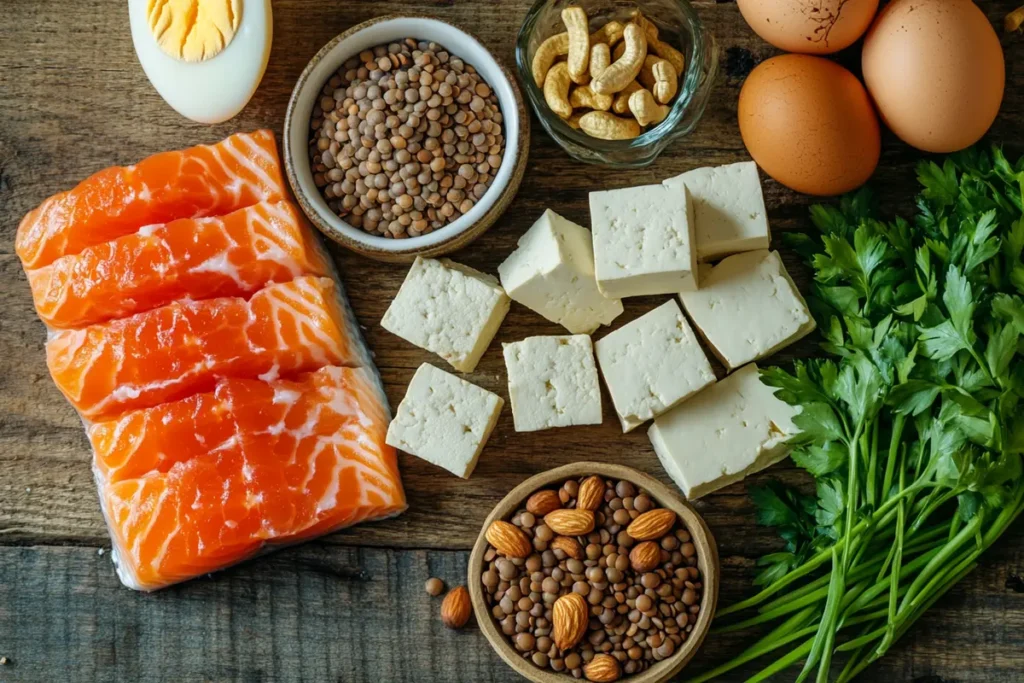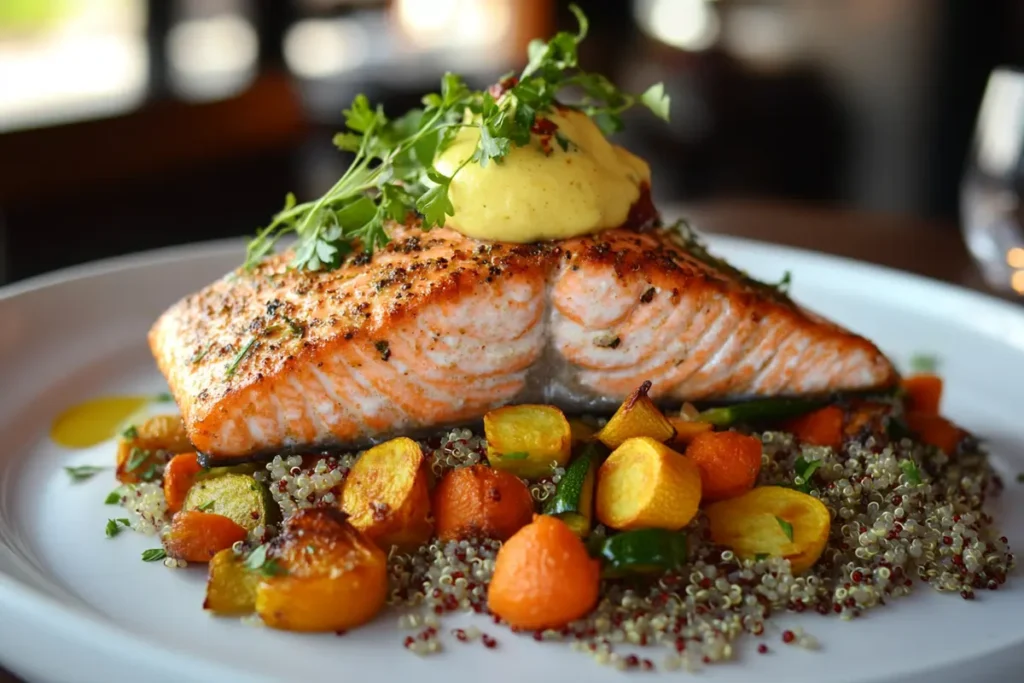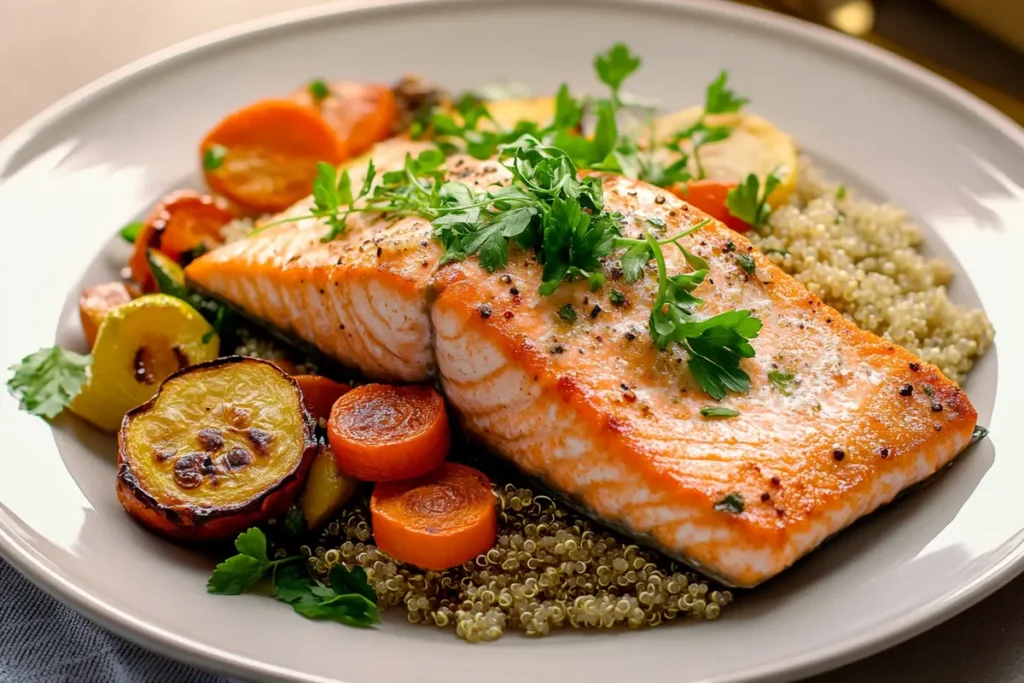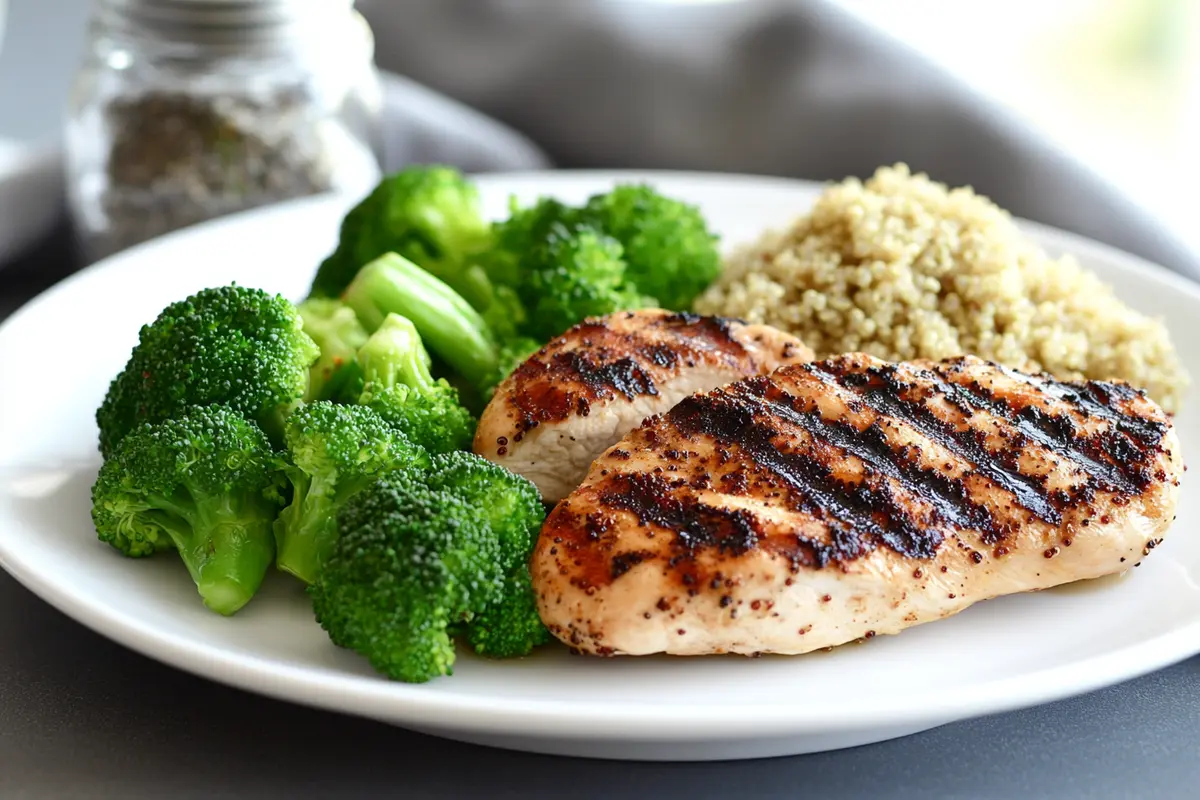High-protein dinners have gained a lot of attention in recent years, sparking debates over their health benefits, potential risks, and overall impact on well-being. From aiding in weight management to supporting muscle repair, incorporating high-protein meals into your dinner routine can seem like a smart choice. But is it truly a one-size-fits-all solution? In this article, we’ll dive deep into the benefits, considerations, and practical tips for creating balanced protein-rich dinners. Let’s unravel the facts!
Understanding High-Protein Dinners
Definition of High-Protein Meals
A high-protein dinner is essentially a meal that contains a higher percentage of protein compared to other macronutrients like carbohydrates and fats. Typically, these meals emphasize lean meats, plant-based proteins, or a combination of both to meet your dietary needs.
Proteins are the building blocks of your body, made up of amino acids that play a crucial role in almost every physiological function. A dinner rich in protein can ensure you meet your daily protein requirements, especially if your goal is muscle repair, weight management, or simply staying fuller for longer.
Importance of Protein in Daily Diet
Protein isn’t just about muscles or fitness enthusiasts it’s a nutrient that benefits everyone. Consuming adequate protein helps repair tissues, produce enzymes, and support hormone production. When incorporated into dinner, protein can help balance your overall macronutrient intake, promoting better energy levels and overall wellness.
Moreover, the timing of protein intake matters. A well-planned high-protein dinner ensures your body has the nutrients it needs for overnight recovery processes, such as muscle rebuilding and cellular repair. It’s no wonder many health-conscious individuals make it a priority!
Benefits of High-Protein Dinners
Health Advantages of Consuming High-Protein Dinners
Adding high-protein meals to your dinner routine can bring numerous health benefits. From supporting muscle growth to improving metabolism, the positive effects are backed by science and practical experience.
Weight Management and Satiety
One of the most significant benefits of a protein-rich dinner is its role in weight management. Protein is known for its satiating properties, meaning it helps you feel full for longer. This can curb late-night snacking and reduce overall calorie intake.
- Protein’s Role in Reducing Appetite: Studies have shown that protein influences hunger hormones like ghrelin and peptide YY, helping you eat less without feeling deprived. For instance, swapping a carbohydrate-heavy meal with grilled chicken or tofu can significantly decrease hunger pangs.
- Impact on Metabolic Rate: Protein also has a higher thermic effect compared to fats or carbs. Simply put, your body burns more calories digesting protein than other macronutrients, boosting your metabolic rate after dinner.
Muscle Growth and Repair
Eating a high-protein dinner can be especially beneficial for athletes, fitness enthusiasts, or anyone engaging in regular physical activity. Protein provides the essential amino acids required for muscle recovery and growth after workouts.
- Importance for Athletes and Active Individuals: When consumed in the evening, protein helps repair micro-tears in muscles caused by physical exertion. Foods like fish, eggs, or legumes offer complete proteins that can enhance recovery while you sleep.
Blood Sugar Regulation
Stabilizing blood sugar levels is another perk of a high-protein diet. Including a protein-dense dinner can prevent sudden spikes and dips in blood sugar levels, ensuring steady energy throughout the night and into the next day.
- Stabilizing Effects on Glucose Levels: Unlike carbs that can cause sharp rises in blood sugar, protein digests slowly and has minimal impact on glucose. This makes high-protein dinners ideal for individuals managing diabetes or those looking to sustain energy for longer periods.
Potential Risks and Considerations
Possible Downsides of High-Protein Dinners
While high-protein dinners offer many benefits, it’s crucial to approach them with balance. Overloading on protein, especially without adequate consideration of other nutrients, can lead to unwanted side effects. Let’s dive into some potential risks and how to address them.
Kidney Health Concerns
One of the most commonly cited risks of a high-protein diet is its impact on kidney function. Although this concern is often overstated for healthy individuals, those with pre-existing kidney issues should be cautious.
- Impact on Individuals with Pre-existing Conditions: Consuming excessive protein can strain the kidneys, as they work harder to process and excrete nitrogen, a by-product of protein metabolism. If you have a history of kidney disease, consulting a healthcare provider is essential before increasing your protein intake.
Nutrient Balance
Focusing too much on protein at dinner can unintentionally crowd out other important macronutrients and micronutrients, leading to an unbalanced diet.
- Importance of Including Other Macronutrients: A meal heavy on protein but lacking in fiber, healthy fats, or carbs might leave you missing essential nutrients. For instance, while grilled chicken is a fantastic protein source, pairing it with whole grains and vegetables creates a more complete meal.
Digestive Issues
Digestive discomfort is another potential drawback of eating a protein-dense dinner, particularly if your body isn’t accustomed to processing large amounts of protein.
- Risk of Constipation and Dehydration: Protein-rich foods, especially animal-based sources, are often low in fiber. Without adequate hydration and fiber intake, this can lead to constipation. Including fiber-rich vegetables like broccoli or sweet potatoes alongside your protein can mitigate this issue.
Ideal Sources of Protein for Dinner
Best Protein Sources for Evening Meals
Choosing the right sources of protein is key to crafting a high-protein dinner that is both nutritious and satisfying. From lean meats to plant-based alternatives, there’s something for everyone.

Animal-Based Proteins
Animal-based proteins are complete proteins, meaning they provide all essential amino acids your body needs. They are particularly popular for their high bioavailability, making them an excellent choice for dinner.
- Lean Meats (Chicken, Turkey): Lean meats are staples for protein-rich meals. For example, a grilled chicken breast not only delivers high-quality protein but is also low in saturated fats. Similarly, turkey is packed with protein while being light on the stomach, perfect for evening consumption.
- Fish and Seafood: Fish like salmon, tuna, and cod are excellent options. Not only are they rich in protein, but they also provide omega-3 fatty acids, which support brain health and reduce inflammation. Shrimp, scallops, and crab are also fantastic additions to your dinner plate.
Plant-Based Proteins
For those following a vegetarian or vegan diet, plant-based proteins can be just as effective in delivering the nutrients you need.
- Legumes (Beans, Lentils): Black beans, chickpeas, and lentils are powerhouses of protein and fiber. They’re also versatile and can be used in soups, stews, or salads, ensuring your meal is both hearty and healthy.
- Tofu and Tempeh: Derived from soy, tofu and tempeh are not only rich in protein but also provide calcium and iron. Marinated tofu stir-fried with vegetables or tempeh served with quinoa is a balanced dinner idea that packs a nutritional punch.

Balancing High-Protein Dinners with Other Nutrients
Creating a Well-Rounded High-Protein Dinner
While high-protein meals are excellent for health, balance is the cornerstone of a truly nourishing dinner. Combining protein with fiber, healthy fats, and other nutrients can elevate your meal, ensuring you reap all the benefits without compromising on variety or taste.

Importance of Fiber
Fiber is often overlooked in protein-rich dinners, but it’s essential for maintaining digestive health and overall well-being.
- Including Vegetables and Whole Grains: Fiber-rich vegetables like broccoli, spinach, and bell peppers not only add color and flavor to your plate but also aid in digestion. Whole grains like quinoa, brown rice, and farro can complement proteins like chicken or beans, making your meal more satisfying.
Healthy Fats
Healthy fats play a vital role in nutrient absorption and overall energy levels. Including these fats in your dinner can make your meal more filling and heart-healthy.
- Incorporating Avocado, Nuts, and Olive Oil: A drizzle of olive oil over grilled fish or a handful of almonds sprinkled over a tofu stir-fry can provide the healthy fats your body needs. Additionally, avocado slices make a great topping for dishes like lean turkey wraps or lentil salads.
Adequate Hydration
Hydration is another factor often overlooked in high-protein diets. Protein metabolism generates nitrogen waste, which requires water for excretion. Pairing your dinner with water or herbal tea can support your body’s hydration needs.
- Ensuring Sufficient Water Intake: Including water-rich foods like cucumber or zucchini in your dinner not only boosts hydration but also adds a refreshing touch to your meal.
Timing and Portion Considerations
Optimal Timing and Portions for High-Protein Dinners
Eating the right amount of protein at the right time can make a significant difference in how your body processes nutrients. Let’s explore how portion sizes and meal timing impact the effectiveness of a high-protein dinner.
Appropriate Serving Sizes
While protein is essential, too much of a good thing can have diminishing returns. It’s important to find the right balance to avoid overloading your system.
- Avoiding Overconsumption: Aim for 20–35 grams of protein in your dinner, depending on your activity level and overall dietary needs. For instance, a palm-sized portion of grilled chicken or a cup of cooked lentils fits within this range. Oversized portions may strain your digestive system without offering additional benefits.
Timing Relative to Sleep
The timing of your high-protein meal is just as crucial as its content. Eating too late can interfere with digestion and sleep quality, while eating too early may leave you feeling hungry later in the evening.
- Effects on Digestion and Sleep Quality: Protein takes longer to digest than other macronutrients. Consuming your dinner 2–3 hours before bedtime allows your body ample time to process the meal without disrupting sleep. For late-night hunger pangs, consider a light, protein-rich snack like Greek yogurt or a handful of nuts.
High-Protein Dinner Recipes
Delicious and Nutritious High-Protein Dinner Ideas
Preparing a high-protein dinner doesn’t have to be complicated or boring. With the right combination of ingredients, you can enjoy meals that are both flavorful and packed with nutrients. Here are some easy-to-follow recipes to get started.
Grilled Chicken with Quinoa and Vegetables
This classic dinner combines lean protein, whole grains, and fiber-rich vegetables for a balanced meal that’s as satisfying as it is nutritious.
- Ingredients:
- 1 medium chicken breast, seasoned with herbs
- 1 cup cooked quinoa
- 1 cup steamed broccoli and carrots
- A drizzle of olive oil
- Preparation:
- Grill the chicken breast until fully cooked.
- Serve alongside quinoa and steamed vegetables, drizzling olive oil for added flavor.
- Why It Works: This dish provides a complete source of protein while the quinoa and vegetables add fiber and essential vitamins.
Baked Salmon with Lentil Salad
Rich in omega-3s and high-quality protein, this meal is perfect for a light yet hearty dinner.
- Ingredients:
- 1 salmon fillet
- 1 cup cooked lentils
- ½ cup diced cucumbers and tomatoes
- Lemon juice and fresh herbs
- Preparation:
- Bake the salmon with a squeeze of lemon juice and your favorite herbs at 375°F for 15–20 minutes.
- Toss cooked lentils with cucumbers, tomatoes, and a dash of olive oil.
- Serve the salmon over the lentil salad.
- Why It Works: The combination of salmon and lentils ensures a well-rounded intake of protein and fiber.
Tofu Stir-Fry with Brown Rice
For vegetarians, this recipe offers a plant-based high-protein dinner that’s loaded with flavor and nutrients.
- Ingredients:
- 1 cup firm tofu, cubed
- 1 cup mixed bell peppers and snap peas
- 1 cup cooked brown rice
- Soy sauce and sesame oil for flavor
- Preparation:
- Stir-fry tofu in sesame oil until golden brown.
- Add vegetables and soy sauce, cooking until tender.
- Serve the stir-fry over brown rice.
- Why It Works: Tofu provides plant-based protein while the veggies and rice create a complete, satisfying meal.
Frequently Asked Questions
Is it safe to eat a high-protein dinner every night?
Yes, it’s generally safe to include high-protein meals in your nightly routine, provided you balance them with other nutrients like fiber, healthy fats, and carbohydrates. However, individuals with kidney or liver conditions should consult a healthcare provider before significantly increasing their protein intake.
Can high-protein dinners help with weight loss?
Absolutely. Protein promotes satiety, which can reduce overall calorie consumption. Additionally, the thermic effect of protein boosts your metabolism, helping you burn more calories. However, portion control and balance are key to sustainable weight management.
What are some vegetarian options for high-protein dinners?
There are plenty of vegetarian protein-rich dinners to explore. Options like tofu stir-fries, lentil curries, and chickpea salads are excellent sources of plant-based protein. Pair these with whole grains and vegetables for a complete, nutritious meal.
How much protein should be included in a dinner meal?
The ideal amount of protein depends on factors like age, weight, and activity level. A general recommendation is 20–35 grams of protein per dinner, which can come from lean meats, fish, eggs, or plant-based sources like beans and tofu.
Are there any side effects of consuming too much protein at dinner?
Consuming excessive protein may lead to digestive issues, such as bloating or constipation, especially if your meal lacks fiber. It’s also important to ensure your overall diet remains balanced, as over-reliance on protein can crowd out other essential nutrients.
Can high-protein dinners affect sleep quality?
In most cases, a high-protein dinner does not disrupt sleep. In fact, the slow digestion of protein can help stabilize blood sugar levels overnight. However, large portions consumed too close to bedtime might cause discomfort, so aim to eat at least 2–3 hours before sleeping.
Conclusion
Summarizing the Impact of High-Protein Dinners
Incorporating high-protein dinners into your daily routine can be a game-changer for your health and well-being. These meals offer numerous benefits, including improved satiety, enhanced muscle repair, stabilized blood sugar levels, and even weight management. Whether you choose lean meats, plant-based proteins, or a combination of both, the possibilities are as versatile as they are nutritious.
However, balance remains the key. Pairing protein-rich meals with fiber, healthy fats, and proper hydration ensures a well-rounded diet that promotes optimal health. Be mindful of portion sizes and meal timing to maximize the benefits while minimizing any potential downsides.
As with any dietary approach, it’s important to personalize your meal plan based on your specific needs, goals, and preferences. Whether you’re an athlete, a busy professional, or someone simply striving for better health, a thoughtfully crafted high-protein dinner can be an excellent addition to your routine.

